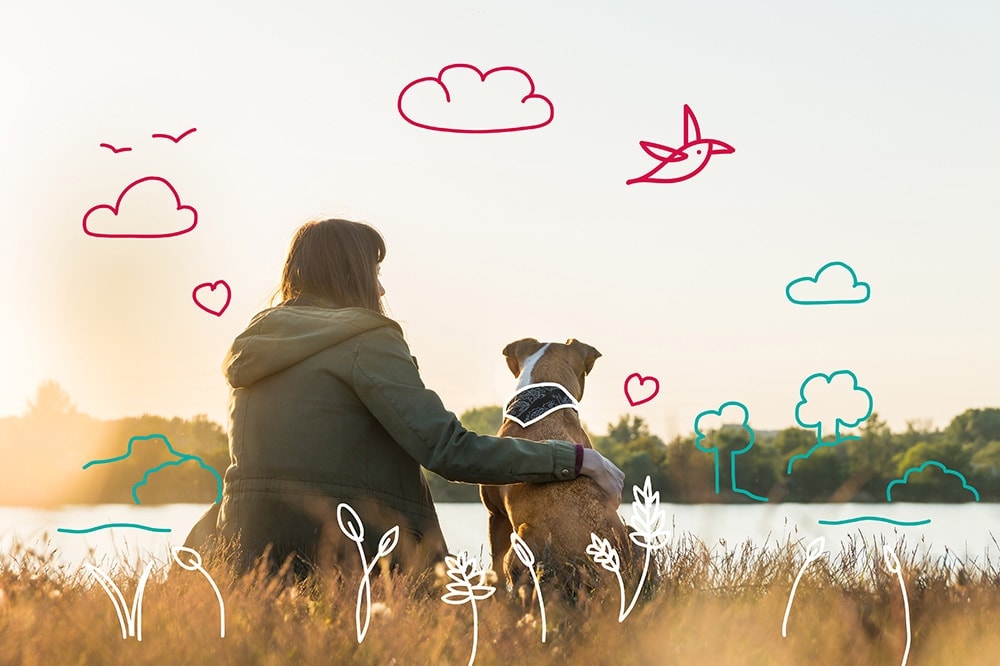Calmer Canines: Helping your Dog with Stress & Anxiety
We often turn to our canine companions for support when we’re feeling anxious or worried. In a recent study (PDSA Paw Report 2020), 89% of owners said that owning their pawsome pal makes them feel mentally healthier.
But did you know dogs can feel stress and worry just like us humans?
Changes in their routine or new additions to the household can trigger anxiety. Sadly, unlike us, they can’t tell us how they’re feeling. There are signs in their behaviour you can look out for and things you can do to help your dog’s mental well-being.

How do dogs become stressed?
Dogs can become anxious for a number of reasons, including:
Separation anxiety: Dogs are generally social creatures and can feel anxious if they are left home alone with no social contact. Following the pandemic, you may have noticed this as we started to back to normal. This can be indicated by signs such as destructive chewing, barking, inappropriate urination and/or defecation and digging.
A new addition to the household: Bringing a new puppy, kitten or baby home can be hugely stressful for dogs. This is linked to territorial anxiety and fears that they will no longer be as important now that your attention is being shared.
Disruption to routine: Like cats, dogs are not keen on changes to their daily routine. Moving house is a big culprit for this, but generally, any form of change to normal everyday life can have a big impact. For example, disruption to their usual feeding routine or walks can cause lots of distress for dogs.
Illness and injury: Pain and distress from an illness and injury can make your dog more dependent on you than normal. This can make them more anxious when left alone.
Spotting the signs of stress
Some of the symptoms that your dog may be suffering from stress and anxiety include:
- Withdrawing into themselves
- Appetite loss
- Barking
- Whining, panting, trembling and shivering
- Restlessness, lethargy and destructive behaviour (especially destructive chewing). Destructive behaviour is particularly common in dogs who are experiencing stress due to separation anxiety.
Because some of these symptoms can be caused by medical problems, it’s strongly advised that you consult your vet to look at underlying causes that may be to blame for your dog’s behaviour. If these have been ruled out, stress and anxiety becomes a much more likely factor.
How to help your dog feel less stressed
While you can’t remove all sources of stress for your dog, you can reduce the potential for anxiety.
Stimulating playtime: Lack of exercise can negatively affect your dog’s wellbeing and stress them out. This becomes even more likely if a lack of playtime also means that there is less interaction with you. Try playing some stimulating indoor games with your dog to build a stronger bond and ensure that your dog doesn’t become stressed due to lack of contact.
Stick to a routine: As far as possible, always try to keep to your dog’s normal schedule. This can be challenging if you’re moving house or if there’s a new arrival in the home, but a lack of routine will only increase your dog’s anxiety in these situations.
Be careful with introductions: Bringing a new pet or baby home will be very stressful for your dog and the initial introductions must be done in a sensitive manner to avoid resentment and jealousy.
Desensitising your dog: If your dog is suffering from separation anxiety, it’s recommended that you try to desensitise them to your departure as part of the treatment. Get your dog used to the idea of your absence by leaving them alone for short bursts of time, gradually increasing it daily over a period of one to two weeks. This will reassure the dog that you will return.
Calming products: There are a number of calming products that can be used alongside environmental changes. Supplements like Zylkene help to promote the feeling of relaxation. Or, if your dog isn’t keen on tablets, Adaptil diffusers are scientifically proven to help anxious dogs. The pheromones they release help dogs feel safe, calm and secure.
It’s always a good idea to have a dog insurance policy in place. That way, you’ll have peace of mind that your canine companion is covered in case of unexpected illness or injury.
You might also be interested in…
Get a quote in minutes…

Existing customers
Call now on 0808 164 7999
to discuss your policy with us.
Monday - Friday: 08:00 - 20:00 Saturday: 09:00 - 14:00





 Back
Back
